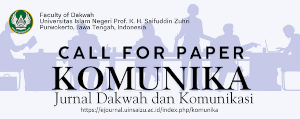Urgensi Implementasi Dakwah Melalui Optimalisasi Potensi Ekonomi Umat
DOI:
https://doi.org/10.24090/komunika.v2i1.804Keywords:
Economy condition of ummoh, da'wa.Abstract
As one of the most important aspects of human life, economy has a significant role to the spirit of Muslim's religiousity. This is driven by the fad that economy is on osped supporting happiness and interesting life and it is also considered o highly valuable aspect in Islam. This paper focuses on da'wa (Islamic preaching) and the economic condition of Muslims. The discussion on da'wa and economy will be more important because in the present time - where human problems are very complex and complicated, especially on economy side - doing da'wa conventionally does not give enough religious enlightenment to ummah. Â Oo'wo needs more creative methods and relevant approaches to achieve the best result. In this case, economy will be studied as on approach to da'wa.Downloads
Download data is not yet available.
References
AI-Alusy, Adam Abdullah. TI. Tarikh a/-Da'wah lslamiyah. TTP: TP.
AI-Mahalli, Imam Jalaluddin dan Imam jalaluddin As-suyuti. TI. Tafsir Ja/alain. TIP: TP.
Amirudin. TI. Manhaj Da'wah Sa/afiyah. Jakarta: Pustaka Azzam.
Anonim. 2000. Kamus Besar Bahasa Indonesia. Jakarta: Departemen Pendidikan Nasional dan Balai Pustaka.
Azwar, Saefudin. 2003. Sikap Manusia: Teori dan Pengukurannya. Yogyakarta: Pustaka Pelajar.
Chaplin. 1993. Kamus Psikologi. Jakarta: Rajawali Press.
Hielmy, lrfan. 2002. Dakwah Bil-Hikmah. Yogyakarta: Mitra Pustaka.
J. Supranto. TT. Pengukuran Tingkat Kepuasan Pelanggan untuk Menaikkan Pangsa Pasar. Jakarta: Rineka Cipta.
Kuntowijoyo, dkk. 1992. Dakwah Pembangunan. Yogyakarta: DPD Golongan Karya lingkat I Propinsi Daerah lstimewa Yogyakarta.
Majalah. MODAL edisi November 2002 ..
Makhfud, Seikh Ali. TT. Hidayat AI-Mursyidin. TTP: TP ..
Purwadi. 2005. Dakwah Sunan Kalijaga: Penyebaran Agama Islam di Jawa Berbasis Kultural. Yogyakarta: Pustaka Pelajar.
Safei, Agus A. dan Nanih Machendrawaty. 2001. Pengembangan Masyarakat Islam; dari ldeologi, Strategi, dan Tradisi. Bandung: PT Remaja Rosdakarya.
AI-Mahalli, Imam Jalaluddin dan Imam jalaluddin As-suyuti. TI. Tafsir Ja/alain. TIP: TP.
Amirudin. TI. Manhaj Da'wah Sa/afiyah. Jakarta: Pustaka Azzam.
Anonim. 2000. Kamus Besar Bahasa Indonesia. Jakarta: Departemen Pendidikan Nasional dan Balai Pustaka.
Azwar, Saefudin. 2003. Sikap Manusia: Teori dan Pengukurannya. Yogyakarta: Pustaka Pelajar.
Chaplin. 1993. Kamus Psikologi. Jakarta: Rajawali Press.
Hielmy, lrfan. 2002. Dakwah Bil-Hikmah. Yogyakarta: Mitra Pustaka.
J. Supranto. TT. Pengukuran Tingkat Kepuasan Pelanggan untuk Menaikkan Pangsa Pasar. Jakarta: Rineka Cipta.
Kuntowijoyo, dkk. 1992. Dakwah Pembangunan. Yogyakarta: DPD Golongan Karya lingkat I Propinsi Daerah lstimewa Yogyakarta.
Majalah. MODAL edisi November 2002 ..
Makhfud, Seikh Ali. TT. Hidayat AI-Mursyidin. TTP: TP ..
Purwadi. 2005. Dakwah Sunan Kalijaga: Penyebaran Agama Islam di Jawa Berbasis Kultural. Yogyakarta: Pustaka Pelajar.
Safei, Agus A. dan Nanih Machendrawaty. 2001. Pengembangan Masyarakat Islam; dari ldeologi, Strategi, dan Tradisi. Bandung: PT Remaja Rosdakarya.
Downloads
Published
2016-12-22
Issue
Section
Articles
License
Authors who publish with this journal agree to the following terms:
- Authors retain copyright and grant the journal right of first publication with the work simultaneously licensed under a Creative Commons Attribution-ShareAlike 4.0 International License that allows others to share the work with an acknowledgement of the work's authorship and initial publication in this journal.
- Authors are able to enter into separate, additional contractual arrangements for the non-exclusive distribution of the journal's published version of the work (e.g., post it to an institutional repository or publish it in a book), with an acknowledgement of its initial publication in this journal.
- Authors are permitted and encouraged to post their work online (e.g., in institutional repositories or on their website) prior to and during the submission process, as it can lead to productive exchanges, as well as earlier and greater citation of published work (See The Effect of Open Access).

























